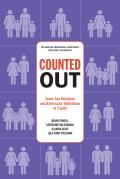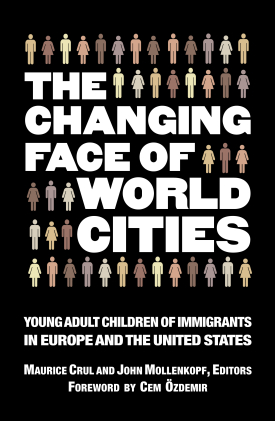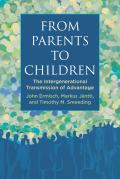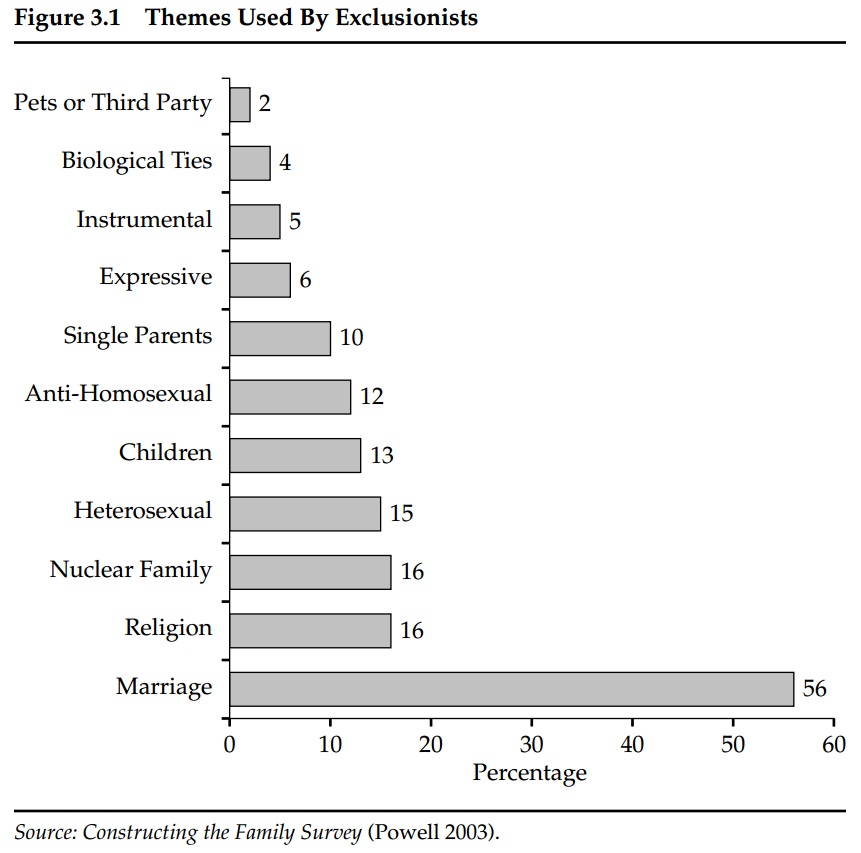 After President Obama announced his support for same-sex marriage, we wrote a post analyzing American attitudes on family and marriage. That research came from Counted Out, which examines currents in public opinion to predict how Americans’ definitions of family may change in the future. The volume has earned excellent reviews over the past two years and the latest issues of Gender & Society and Contemporary Sociology add to the praise:
After President Obama announced his support for same-sex marriage, we wrote a post analyzing American attitudes on family and marriage. That research came from Counted Out, which examines currents in public opinion to predict how Americans’ definitions of family may change in the future. The volume has earned excellent reviews over the past two years and the latest issues of Gender & Society and Contemporary Sociology add to the praise:
M. V. Lee Badgett, University of Massachusetts, Amherst:
This excellent recent book, Counted Out, by a team of sociologists including Brian Powell, Catherine Bolzendahl, Claudia Geist, and Lala Carr Steelman, is one of the most insightful and readable books to explain the changes in Americans’ views of family that are driving these debates and legal changes. Powell et al. angle their analytical lens to illuminate the borders of Americans’ definition of family and how they set those boundaries that bring same-sex couples in or keep them out.

The Changing Face of World Cities
About This Book
A seismic population shift is taking place as many formerly racially homogeneous cities in the West attract a diverse influx of newcomers seeking economic and social advancement. In The Changing Face of World Cities, a distinguished group of immigration experts presents the first systematic, data-based comparison of the lives of young adult children of immigrants growing up in seventeen big cities of Western Europe and the United States. Drawing on a comprehensive set of surveys, this important book brings together new evidence about the international immigrant experience and provides far-reaching lessons for devising more effective public policies.
The Changing Face of World Cities pairs European and American researchers to explore how youths of immigrant origin negotiate educational systems, labor markets, gender, neighborhoods, citizenship, and identity on both sides of the Atlantic. Maurice Crul and his co-authors compare the educational trajectories of second-generation Mexicans in Los Angeles with second-generation Turks in Western European cities. In the United States, uneven school quality in disadvantaged immigrant neighborhoods and the high cost of college are the main barriers to educational advancement, while in some European countries, rigid early selection sorts many students off the college track and into dead-end jobs. Liza Reisel, Laurence Lessard-Phillips, and Phil Kasinitz find that while more young members of the second generation are employed in the United States than in Europe, they are also likely to hold low-paying jobs that barely life them out of poverty. In Europe, where immigrant youth suffer from higher unemployment, the embattled European welfare system still yields them a higher standard of living than many of their American counterparts. Turning to issues of identity and belonging, Jens Schneider, Leo Chávez, Louis DeSipio, and Mary Waters find that it is far easier for the children of Dominican or Mexican immigrants to identify as American, in part because the United States takes hyphenated identities for granted. In Europe, religious bias against Islam makes it hard for young people of Turkish origin to identify strongly as German, French, or Swedish. Editors Maurice Crul and John Mollenkopf conclude that despite the barriers these youngsters encounter on both continents, they are making real progress relative to their parents and are beginning to close the gap with the native-born.
The Changing Face of World Cities goes well beyong existing immigration literature focused on the U.S. experience to show that national policies on each side of the Atlantic can be enriched by lessons from the other. The Changing Face of World Cities will be vital reading for anyone interested in the young people who will shape the future of our increasingly interconnected global economy.
MAURICE CRUL is professor of sociology at Erasmus University Rotterdam.
JOHN MOLLENKOPF is Distinguished Professor of Political Science and Sociology, and director, Center for Urban Research, at The Graduate Center, City University of New York.
CONTRIBUTORS: Richard Alba, Susan K. Brown, Leo Chavez, Louis DeSipio, Rosita Fibbi, Nancy Foner, Barbara Herzog-Punzenberger, Philip Kasinitz, Elif Keskiner, Jennifer Lee, Laurence Lessard-Phillips, Leo Lucassen, Liza Reisel, Jeffrey G. Reitz, Jens Schneider, Philipp Schnell, Patrick Simon, Thomas Soehl, Van C. Tran, Constanza Vera-Larrucea, Mary Waters, Min Zhou.
RSF Journal
View Book Series
Sign Up For Our Mailing List
Apply For Funding
 Jane Waldfogel is a professor of social work and public affairs at Columbia University School of Social Work. She has written extensively on the impact of public policies on child and family well-being. She also contributed research to the RSF volumes Persistence, Privilege and Parenting and From Parents to Children.
Jane Waldfogel is a professor of social work and public affairs at Columbia University School of Social Work. She has written extensively on the impact of public policies on child and family well-being. She also contributed research to the RSF volumes Persistence, Privilege and Parenting and From Parents to Children.
Q: As part of our volume Privilege, Parenting and Persistence, you and Elizabeth Washbrook examined income-related gaps in school readiness among children in the U.S. and the U.K. You found that parenting behavior played a big part in the significant disparities between the children. What parental practices are we talking about here?
A: The most important aspect of parenting, in particular for young children, is whether it is responsive and sensitive to the child. This is of course difficult to measure, so often in large datasets we have to rely on measures of other aspects of parenting, such as whether the parent provides cognitively stimulating materials (such as books and toys), whether the parent is warm and supportive of the child, or whether the parent uses harsh discipline. Reading with children is also important, particularly for early literacy and language development.
Q: Several policymakers have suggested that improving children's outcomes needs to involve encouraging better parenting. Barack Obama, for example, often exhorts parents to read more to their children. But what does the research tell us about the success of initiatives in changing family practices? Are there any promising efforts on the horizon?
A: We have known for some time that parenting is really important for children’s outcomes, but until recently, the consensus among social scientists was that we did not have much rigorous evidence that parenting programs are effective at improving parenting and children’s outcomes. But this has been changing. We now have good evidence, from randomized controlled trials, that well-designed programs can be effective at improving parenting and child outcomes. One of the best examples in this regard is the Nurse-Family Partnership Program, which is now being expanded nationwide (and in other countries such as the United Kingdom).
 Miles Corak is a professor of economics at the University of Ottawa. He has published numerous articles on topics dealing with child poverty, access to university education, intergenerational earnings and education mobility, and unemployment. He has also contributed to two RSF volumes on economic mobility—From Parents to Children (2012) and Persistence, Privilege and Parenting (2011).
Miles Corak is a professor of economics at the University of Ottawa. He has published numerous articles on topics dealing with child poverty, access to university education, intergenerational earnings and education mobility, and unemployment. He has also contributed to two RSF volumes on economic mobility—From Parents to Children (2012) and Persistence, Privilege and Parenting (2011).
Q: In your chapter in Persistence, Privilege, and Parenting, you compare the effects of family background on mobility outcomes in Canada and the United States. First, why should people interested in inequality and mobility look in particular at the different results in these two countries? And second: is the ‘American Dream’ more achievable in Canada?
A: Perhaps the best way to answer this question is to consider what we mean by this phrase.
The "American Dream" is a very important metaphor in the United States, indeed some would say a defining metaphor. But it has a host of meanings, and our analysis speaks to the idea that economic outcomes should be the result of the energies, talents and motivations of individuals than of their family background. The American Dream is about becoming all that you can be regardless of your starting point in life.
In fact, we used similarly designed public opinion polls in the two countries to ask representative samples of Americans and Canadians what they understood the American Dream to mean, and surprisingly they answered in very much the same way, indeed in some scenarios we put to them, exactly in the same way. Both Americans and Canadians value freedom, being able to accomplish anything that you want, and to have the basic opportunities like health and education to do so.
On average, it is pretty clear that there is more mobility, up to three times more mobility, in Canada than in the United States.Canadians differ from Americans in that they have a stronger tendency to see government policy as just another tool to help them achieve their individual goals. I don't want to overstate this tendency, but it is clear that Americans have a stronger tendency to see government as hindering rather than helping them, and that this could reflect a belief about the effectiveness of public policy as much as a principled stand against it.
There is value in comparing these two countries precisely because Americans and Canadians share some important values and goals, and because labour markets function in broadly similar ways on both sides of the border. But also because attitudes to public policy and the actual design of policy differ. These are differences that we potentially can all learn from, and that might be transferable across the countries.
To the extent that we measure the American Dream by the degree of relative earnings mobility across the generations --- by how closely tied a child's adult position in the earnings distribution is to the position occupied by his or her parents --- then on average it is pretty clear that there is more mobility, up to three times more mobility, in Canada than in the United States.
But the major point of our chapter was that this difference reflects differences in mobility at the two extremes of the earnings distribution. In fact, the broad majority of Canadians and Americans born to parents in the broad middle of the earnings distribution experience considerable mobility both upward and downward. But Americans born to parents at the top and the bottom are more likely than Canadians to become, respectively, the top and bottom earners of the next generation. It is in this sense that some might suggest that the American Dream is more of a reality north of the 49th parallel.
 In March 1999, U.K. Prime Minister Tony Blair made a remarkable pledge before a startled audience: "Our historic aim will be for ours to be the first generation to end child poverty," he said. "It will take a generation. It is a 20-year mission. But I believe that it can be done if we reform the welfare state and build it around the needs of families and children." The unexpected announcement came in the midst of an alarming rise in the country's child poverty, which hovered around the 20 percent level by the mid-1990s. (See Figure 1.3 below for an international comparison; poverty was defined as income below half of the country's median income). But would such an ambitious pledge make a difference? With its echoes of Lyndon Johnson's "war on poverty" speech, now often cited in conservative circles as evidence of policy hubris, would Blair's ambition merely reveal the intractable problems underlying poverty?
In March 1999, U.K. Prime Minister Tony Blair made a remarkable pledge before a startled audience: "Our historic aim will be for ours to be the first generation to end child poverty," he said. "It will take a generation. It is a 20-year mission. But I believe that it can be done if we reform the welfare state and build it around the needs of families and children." The unexpected announcement came in the midst of an alarming rise in the country's child poverty, which hovered around the 20 percent level by the mid-1990s. (See Figure 1.3 below for an international comparison; poverty was defined as income below half of the country's median income). But would such an ambitious pledge make a difference? With its echoes of Lyndon Johnson's "war on poverty" speech, now often cited in conservative circles as evidence of policy hubris, would Blair's ambition merely reveal the intractable problems underlying poverty?
 When sociologist Brian Powell and his team asked more than 1,500 Americans to define what counts as family, he found that respondents fell into three broad categories:
When sociologist Brian Powell and his team asked more than 1,500 Americans to define what counts as family, he found that respondents fell into three broad categories:
•Exclusionists (roughly 45 percent of his sample) strongly privilege the traditional heterosexual family; • Moderates (roughly 29 percent) place more primacy on children and extend family status to any arrangement with children; • Inclusionists (25 percent) have a broad conception of family that is flexible and expansive.
Digging deeper, Powell analyzed the themes and reasons each group invoked to explain why they believed certain living arrangements counted (or did not count) as family. Here are the themes used by people in the 'exclusionist' category:

In his RSF book, Counted Out: Same-Sex Relations and Americans' Definitions of Family, Powell elaborates:
The transcripts of our interviews are replete with phrases such as "the marriage vow," "the marriage covenant," "ceremonial arrangements," "legal marriage," "legal connection," and "legally binding." In their references to marriage, exclusionists also often mentioned the gender of the marital partners—most notably specifying them as "man and wife," "man and wife living together," or "marriage between a man and a woman"—thus making it explicit that their definition excluded gay and lesbian couples.
 Editor's Note: Hazel Rose Markus is the co-editor of RSF's volume Facing Social Class: How Societal Rank Influences Interaction. At the 2012 Being Human conference, she discussed the psychology of social class. We include video of her lecture as part of our forum on social class in America. Her presentation begins at 27:20.
Editor's Note: Hazel Rose Markus is the co-editor of RSF's volume Facing Social Class: How Societal Rank Influences Interaction. At the 2012 Being Human conference, she discussed the psychology of social class. We include video of her lecture as part of our forum on social class in America. Her presentation begins at 27:20.
Being Human: Individual + Society & Morals + Culture from Being Human on FORA.tv
 Editor's Note: Susan T. Fiske is the co-editor of RSF's volume Facing Social Class: How Societal Rank Influences Interaction. As part of our forum on social class in America, she discusses class hierarchies and resentment below.
Editor's Note: Susan T. Fiske is the co-editor of RSF's volume Facing Social Class: How Societal Rank Influences Interaction. As part of our forum on social class in America, she discusses class hierarchies and resentment below.
Whoever thought it would come down to whether $750K versus $42 million is too much income to be the President? This election season, we are hearing more than we want to know about the income of the two major candidates. Every election, we pit Main Street against Wall Street, and both against Skid Row. It’s as if we think there are only three kinds of people: the haves, the have-nots, and the have-lots.
As I wrote in the Washington Post last year:
What divides the country is what we should do with the low-income have-nots (poor people, old people: deny them?) and the high-income have-lots (rich people: tax them?), from the perspective of the rest of us in the middle, the haves. As a social psychologist, I find this process a perfect example of how status always divides us from each other.When we, the haves, look up at the have-a-lots, we envy them and aspire to their success, so we do not apparently want to clip their wings by taxing them, because maybe someday we will be rich too…
Looking down from our middle ground to the have-nots, we hardly seem to bother ourselves about them. Although Americans are big-hearted and donate more generously to charity than most places, we begrudge the old and the poor much in the way of government entitlements. We seem to scorn them as unworthy of our attention. In my lab, we find that people do not even want to consider the personal experience of homeless people; we deny them a mind, making it easier to neglect them.
